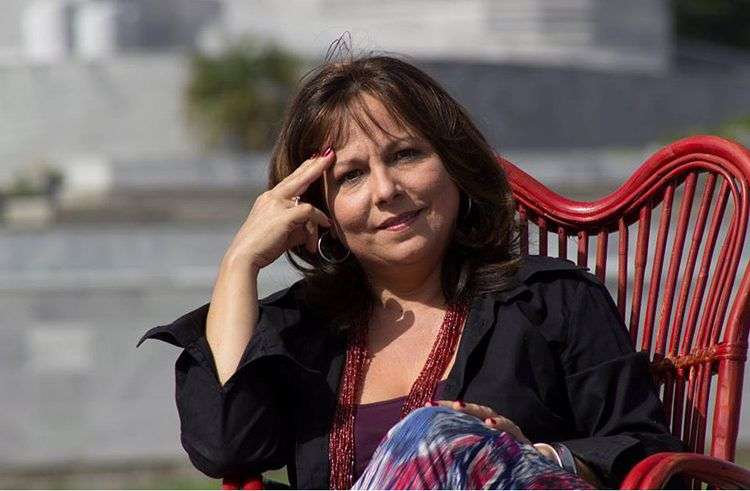The Cuban singer Liuba Maria Hevia believes in the things that flow in art, inspiration, in the Muses and signals. “When a melodic idea or phrase comes to torture me deliciously, I take the guitar and start looking where it is” revealed the composer of songs like Ausencia, Si me falta tu sonrisa, Estela granito de canela, Como un duende y Ángel and Habanera.
Despite playing sensibilities with her compositions, Liuba doesn’t see herself as a poet, and the voice that musicologists describe as exceptional is alien to her since she hears herself differently in recordings. By contrast, those around her, admire the stability of her colorful voice in rehearsals and scenarios. It may seem hard to believe in these very technological times that add artifacts to voices with some semblance of natural, but the discs of Hevia faithfully reflect her tones, timbres and melodies.
Just a year ago, among the Karl Marx theater curtains, a group of guest dancers dancing were warming up before some songs when sound filled the room, we all thought that the audio technician was testing a drive and well into the theme of singer stopped the piece because an instrument was not heard optimally. Just at that moment we realized that this was not a recording but Liuba in person. “She has the wonderful ability to be heard on disks and theaters alike,” then said Lisandra Gomez of the Endedans Contemporary Ballet of Camagüey.
Owner of a sweetness that facilitates success in her own repertoire and others, the singer is preparing a concert to celebrate her half century of life and latest album. The date is Dec. 13 at the Mella Theater in Havana.
The show, titled Luna del 64, will offer a tour of a career in which converge with elegance guajiras, sones, danzons, habaneras and even tangos, regardless of the current fashion.
“Freedom is to be used and I have done in the best sense, I sang what I wanted, beyond fads, so I have a sense of peace,” confessed minutes before a rehearsal in her studio, located on Oficios Streeti, in the so-called historic center of the Cuban capital.
“Being different is not an approach that one becomes aware, being different is a cost to defend what you mean, the way you want to,” she said with her usual courage.
At the concert, the Goodwill Ambassador of the United Nations Fund for Children will devote time to children, for that basic link of society led to some of her records and she feels very young.
“The great Teresita Fernández said that one thing is the age of the body and another of the soul, and I feel like a teenager starting my career,” said the singer who in 2012 recorded an album with the songs selected for her by the extraordinary Cuban children’s music composer, who died in 2013.
“I was a very sickly child and one of the things I was doing me much good music. Rather I remember that when I work with children, the pleasure I felt when I heard a melody, “said with a twinkle in her eyes, because talking about music turns her on.
After three decades of professional experience and several awards, Hevia still experiences a scare before going out in public, but loves the theater and in this final concert of 2014 will share the stage with the singer Beatriz Márquez, who was popularly called La Musicalísima of Cuba.
In more than a dozen albums, Liuba has enjoyed collaborations of Cubans Silvio Rodriguez, Chucho Valdés, José María Vitier, Pancho Amat, David Torrens, Spanish singer and actress Ana Belén, Portuguese singer Luis Represas and Spanish Jose Angel Hevia, among others.
Art forms such as dance and theater again with her in the upcoming show, which opens a space for the most recent album, El mapa de mis canciones, with which the composer wishes to honor all teachers and settle an outstanding debt with guitar .
“They are 31 years of professional life, but I think that since I can remember I’m dreaming of music. The guitar was settled obsession in my childhood that my mother took me to a hospital and everything, because it was a fixed idea since I discovered the instrument, “she said.
A very humble family could not give her a guitar until she was 13 years of age, so she was eight she played on guitars borrowed from friends. At the time, she often heard radio and a cassette recorder in her aunt’s house in Habana del Este.
“I think it changed my life, as a child, being in my aunt’s house in the Guiteras neighborhood, listening La era está pariendo un corazón and Te doy una canción by Silvio Rodríguez. Just imagine what a child can think of these songs? I cannot explain it, but it’s something I wanted to play, make, dialogue from the instinct of sensitivity, because there was no knowledge at that time, “admitted thoughtfully.
“But surely I and other troubadours, without that reference, we were something else. I am convinced that without the presence of the Nueva Trova, I had been in love with the guitar and music, because they came to me before, but I were another person, another artist and a human being, and see music and song differently, “she said
As customary in each interview, she thanked the singer Pablo Milanes the opportunity to record her first album Coloreando la esperanza, in 1993, and said that for her creation is a consequence of living, not the reverse.
She is still overwhelmed by the sense of the unfinished word, but also the tranquility of having done what she wanted. In 2014, Liuba presented a compilation book of her lyrics and illustrative of some details of her biography. One of the key teachers in adolescence of the artist told her mother that the daughter had a head full of songs.
Listening to her does well, but she just knows she talks with poetry and could still write more.










